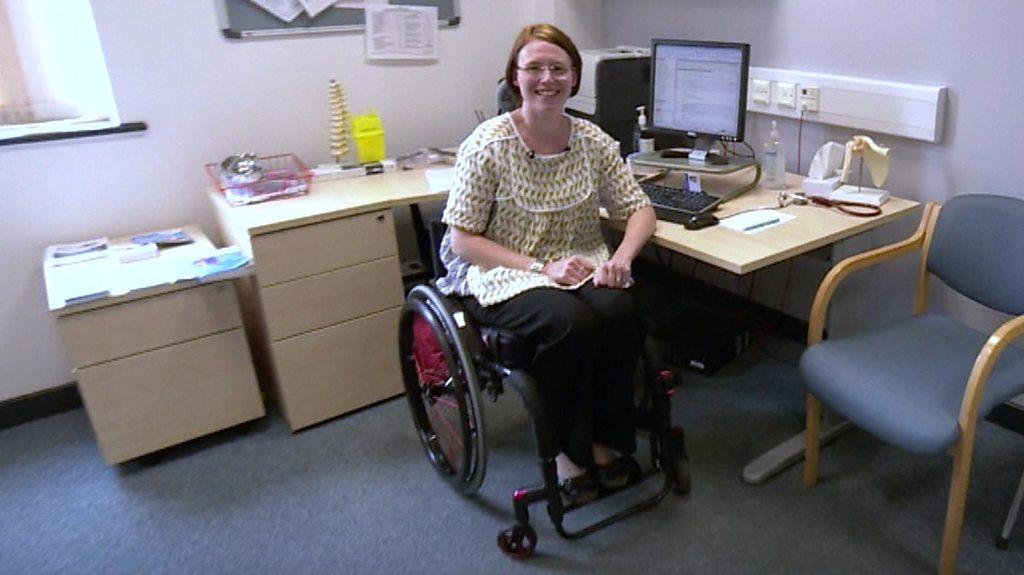The disabled doctors not believed by their colleagues
- Published
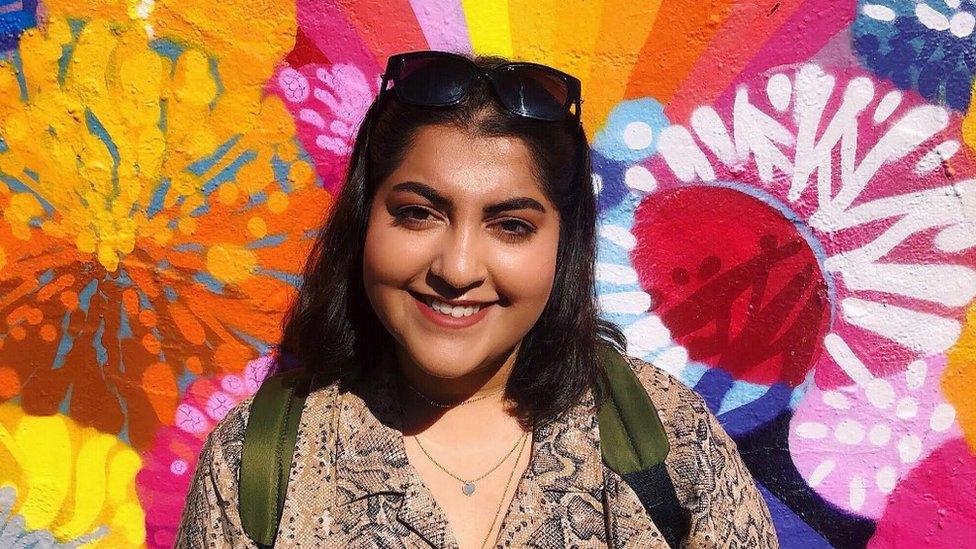
People often feel nervous when they visit a doctor with some fearing their symptoms may not be believed. But what if you are the doctor, and your colleagues dismiss your disabilities and mental health difficulties? Miranda Schreiber explores this challenging relationship.
When I was 15, I described what turned out to be the neurological symptoms of mental illness to my doctor. I told him I couldn't do schoolwork, feel the cold, or understand a book. He suggested I go on walks if I was stressed.
This breakdown in communication, in which patient and doctor seem to live in different worlds, is well-documented by disabled people. Many feel they have to translate their experience, because disability and medical structures seem incompatible.
But this experience is familiar to disabled doctors too, and some are seeking solutions.
Sarah Islam was a fourth year medical student at Indiana University when she developed a chronic illness which caused exhaustion, chronic pain, and cognitive impairment. She said her symptoms, which didn't tick a specific box, made her feel like she lacked fluency in the medical language she was learning.
'Brick wall'
"I remember, even as a med student, having the vocabulary to explain what I was going through but feeling like I had hit a brick wall," she says. "I actually didn't know how to describe it."
With her experience of sickness, Islam shifted from believing legitimate illness could be diagnosed to living as a patient with symptoms which didn't fit a clear disease profile.
But she noticed a change in her colleagues too, when she returned to medical school after a period of recovery.
"If I said the word 'pain' [colleagues] took it as coded language for 'I'm lazy' and 'I can't do my work'.
"They would challenge my reality," she says, something which led her to conceal her symptoms. "I felt like everything I shared was going to be weaponized against me. They would say 'you walked two days ago so why can't you walk today?' Almost like they caught me in a lie.
"The baseline understanding of what it means to be disabled is not there."
This sort of discrimination is often referred to as ableism - which favours non-disabled people over those with disabilities.
It is made all the harder to confront in medicine when disabled clinicians are vastly underrepresented. Disabled people make up about 20% of the population in the UK and US but only 2% of British and American doctors.
Islam says simple accommodations like taking notes in front of patients, or taking the elevator rather than the stairs, were criticised by her advisors as unprofessional. And these same attitudes, Islam explains, manifest in patient interviews.
"It's completely baffling to me how we can expect patients to respect us when we won't even believe what they're telling us.
"It's scary to be viewed as good or bad because you can or cannot work," she says.
Hardeep Lotay, a fifth year medical student at the University of Cambridge and mental health advocate, sympathises with Islam. "There's the idea in medicine you have to stretch yourself further than is reasonable because that's the nature of the profession," Lotay says, who also researches medical racism.
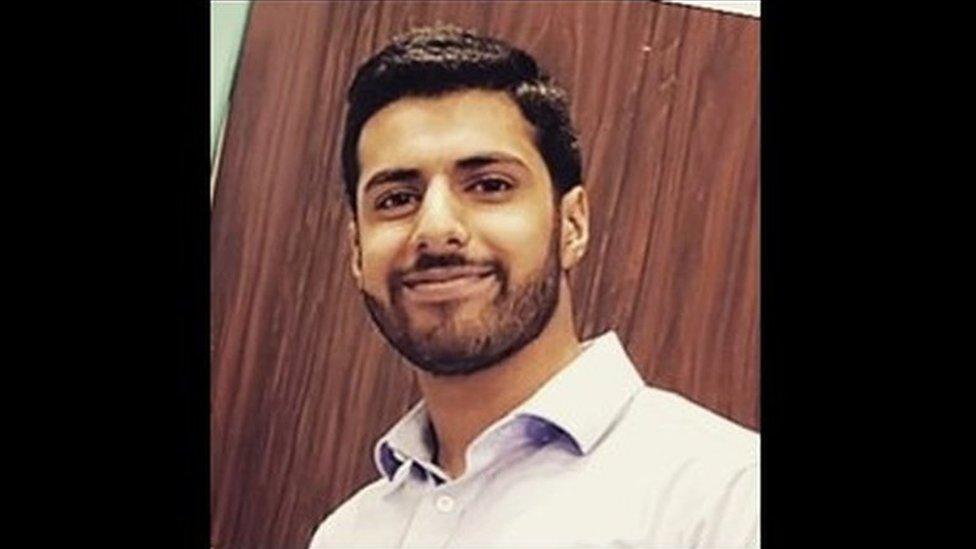
"I took a year-and-a-bit out from the course. In medical school any difference is seen as weakness, and any weakness is taken to mean you're not as good as your cohort. There's stigma in everyone knowing you've taken time off.
"It can be very negative to see the perception of psychiatry patients from your colleagues and seniors."
The attitudes Lotay and Islam experienced were also identified in research by Drs. Havi Carel and Ian Kidd, philosophy professors at the University of Bristol and University of Nottingham.
They found medical experts often perceive disabled patients as incapable, unreliable, and emotionally unstable, leading clinicians to "downgrade the credibility" of what disabled patients say.
This discrimination can impact treatment decisions and compromise disabled patients' health, increasing their risk of secondary conditions.
'Gaslighting the patient'
Revealingly, Canada Care Connection, which helps patients find family doctors, found in its team audits that patients with chronic pain took the longest to place, and that some family doctors refused to see "undesirable" patients because of a disability. "They just won't accept them," one Care Connector wrote.
Joanna, a disability activist from New Jersey, has mast cell activation syndrome. The disorder causes overactive mast cells - which form part of the immune system - which trigger anaphylaxis. Joanna lived without medical support until she was 25 because doctors believed she was exaggerating her symptoms.
"I wish medical students were taught to be open to information disabled patients provide," she says. "It's okay for a medical student or doctor to admit that they don't have the answer. That's so much more helpful than gaslighting the patient."
This is something the University of Michigan is trying to address. Its medical school has started providing students with teaching sessions focused on disability in its entirety - from disability pride to the everyday and justice.
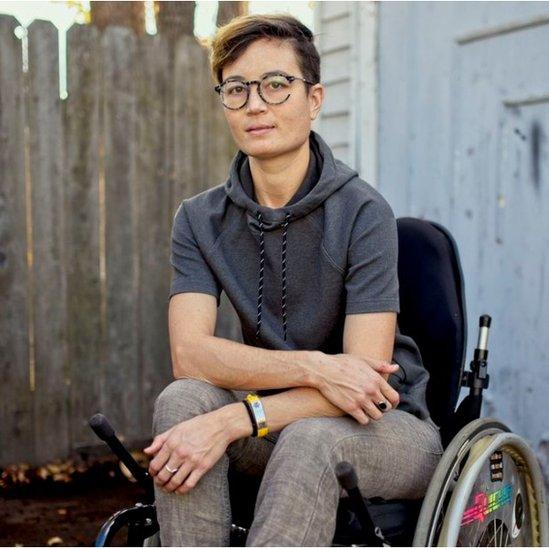
But there are also the disabled activists, medical students and doctors who propose that the breakdown in communication could be reduced if there were more disabled physicians.
"As a disability activist who's proud of being disabled, there's a vocabulary of identity that I can't use with doctors," says Charis Hill, an activist from Sacramento, California. "They think disability is bad. It's what they want to keep you from becoming.
"With a disabled doctor I wouldn't have to explain so much because we're speaking the same language," they say. "My care outcomes would be so much better because I would be understood."
Lotay and Islam have both used their personal experience to guide the way they approach medicine.
"If a patient comes to you and tells you they're completely deflated, you can communicate with them and speak a language of mental health," says Lotay.
Dr. Duncan Shrewsbury, a clinician and senior lecturer at Brighton and Sussex Medical School who has ADHD, agrees.
"We should be systematically looking at how we support and advocate for disabled learners, both at university and postgraduate training levels," he says.
"It wasn't until disabled people chained themselves to the front of a bus [in the UK] that disability legislation started looking at public services needing to cater to people with different abilities," he says, reflecting on the 1995 protests for disability rights.
The University of Michigan has also tried to address barriers by altering its technical standards for admission. Disabled applicants no longer need to demonstrate physical competencies, like being able to lift a patient.
But Islam observes that practicing medicine is only part of the challenge.
"The barriers start before any of us even apply," she says. "If this had happened to me when I was 17 I probably wouldn't have had the energy, or the finances frankly, to apply. It's clear you are not the person wanted in this field."
But with systemic change, things could be different.
The experiences I described to my doctor when I was 15 did not need to be beyond understanding.
Perhaps, rather than recommend I go on walks, my doctor might have said: "I have felt the same way."
For more disability news, follow BBC Ouch on Twitter, external and Facebook, external and subscribe to the weekly podcast on BBC Sounds.

Related topics
- Published7 November 2020
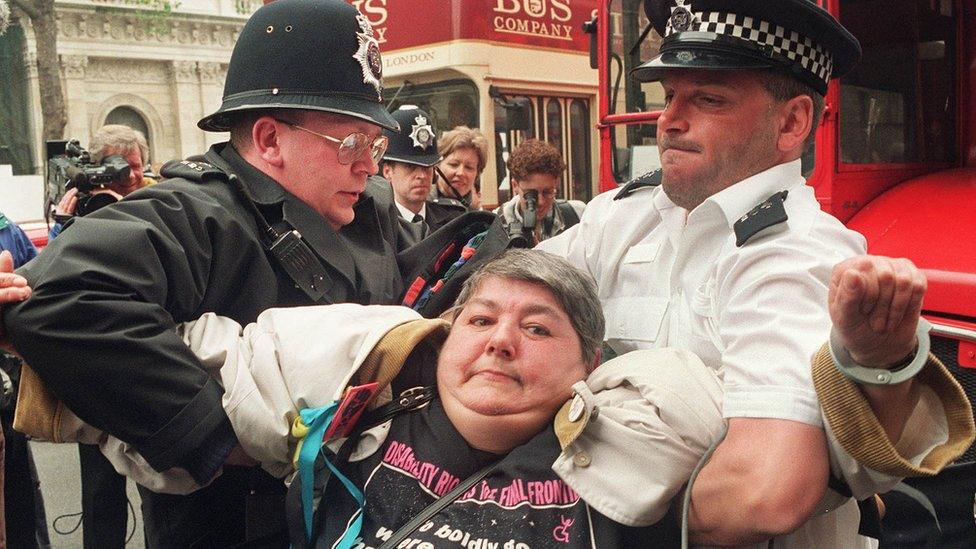
- Published12 June 2019
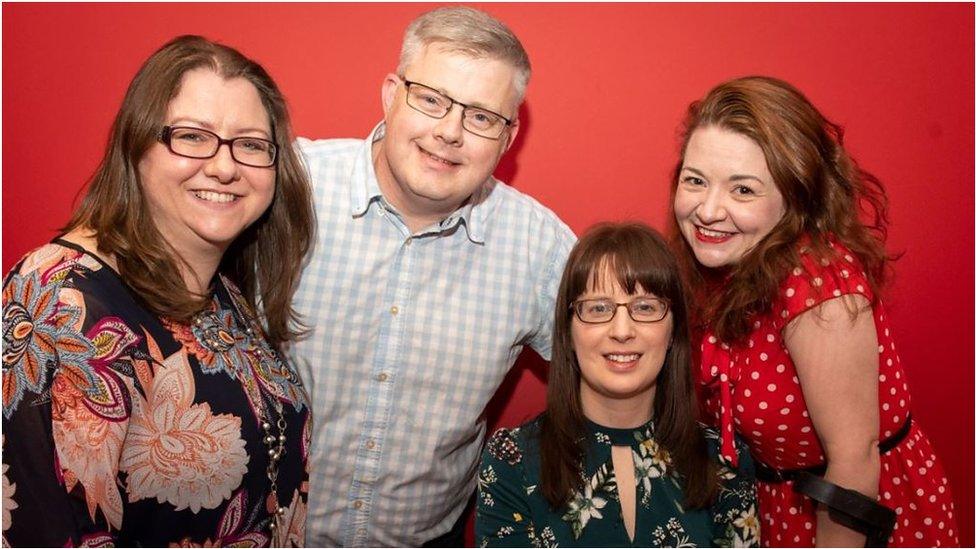
- Published3 July 2018
